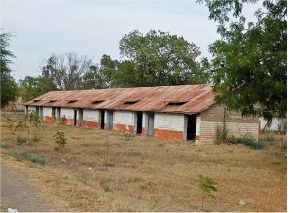Just after the Sino-Indian War of 1962, about 3,000 Chinese-Indians1 were interned in a disused World War II POW camp in Deoli, Rajasthan, marking the beginning of a painful five-year-long internment for some without resolution. At a time of India’s war with China, ‘Chinese-looking’ people had fallen prey to government suspicion and paranoia which soon seeped into the public consciousness. This is a page of history that comes wrapped in prejudice and fear, and is today largely forgotten.
As several Indian communities are once again faced with discrimination, my book The Deoliwallahs co-authored by Dilip D’Souza records these untold stories through extensive interviews with seven survivors of the Deoli internment. Through these accounts, the book recovers a crucial chapter in India’s past, documenting for the first time how the Chinese came to be in India, how they made the adopted country their home and became a significant community, until the war of 1962 brought on a terrible incarceration, displacement and tragedy.
D’Souza records these untold stories through extensive interviews with seven survivors of the Deoli internment. Through these accounts, the book recovers a crucial chapter in India’s past, documenting for the first time how the Chinese came to be in India, how they made the adopted country their home and became a significant community, until the war of 1962 brought on a terrible incarceration, displacement and tragedy.
History is also repeating itself across the globe as Asian-Americans face violence and racism because they look different and remind people of the “enemy”. The stories of the survivors of the internment now over five decades are important reminders of how incarceration begins and tears apart families and steals the lives of those who survive it. The following is my mother’s testimony and an excerpt from The Deoliwallahs. At the time my family lived with our grandparents in Hasimara in the Doars of Darjeeling Hills where the family ran a timber business.
I wrote an article for Outlook India2 for a special section dedicated to the fiftieth anniversary of the war and the internment that followed. It contained my mother Effa’s testimony of the events leading up to her internment with my father and my brothers.
It is reprinted here:
“I remember 18 November 1962 was the day all the Chinese workers in our factory were interned. It was in the morning. Since the carpenters did not speak English, your Dad had to interpret the order for them. They were to leave immediately and had time to pack only a few belongings. Each man packed a little. They were gone by noon. Their wives and children wept as they watched their husbands and fathers taken away. Your grandfather promised the workers we would look aft er their families for as long as we were there.
Soon after that day, we heard that Chinese passport holders in Darjeeling and Assam were being interned. Like our staff, only the Chinese men were taken, not their families. Your dad’s sister, her husband and the rest of her husband’s family were also interned in November. Your grandmother burst into tears when she heard the news. I read to her a report from Amrita Bazaar Patrika,3 about how well the internees were treated. I’m not sure it comforted her, but she seemed a little happier.
A few days later, the army came to collect our vehicles to use in the war. Our driver went with the car, too. We were told not to leave the compound. Without cars, there was nowhere we could go. Four guard posts were erected around the compound. Each had two men guarding and they were there twenty-four hours a day. Lal Bahadur, who had worked for us for years, went to shop for our groceries. When Lal Bahadur brought back the vegetables and meat, the guards examined his bags.
The army was billeted at the airport. Every day, the soldiers drilled and marched. Tanks and combat vehicles rolled past. Trucks and lorries drove on the main road, which was just a few yards from our gate. From the verandah we watched nervously and told the children not to go near the gate. We lived in uncertainty and fear every day.
It seemed we were going to have to go to Deoli, so we all started packing. Each family member had a suitcase. Your grandfather checked his luggage every day. He was diabetic and seventy years old. Some days, he found the suitcase too heavy and unpacked items. The next day, he would find them necessary and pack them back into the suitcase. We all did similar things, sometimes laughing at the choices we made. It was strange what we chose to pack. A photograph, our wedding certificate, socks …
We didn’t have much to do. The factory and sawmill were closed. Our staff, minus the Chinese carpenters who were already been interned, was still living in the compound. Then we started culling the livestock. Every day we took a few ducks and chickens and prepared them for meals. Nothing tasted good anymore. Everyone ate like machines, but preparing the food gave us something to do.
This went on for a month. We followed the newspapers, often afraid of what we would read. The Chinese army had stopped all incursions in December 1962 and had pulled back to their lines. We knew this because our driver (Sundar) and cars had come back from the border. The jeep had been used for transporting supplies and for medical evacuation. It looked like it had been in a war. A week before the Chinese New Year, our hopes lifted. Your grandmother got us started on making New Year sweets and cookies.
On New Year’s Eve, your grandfather pointed to the packed suitcases lining the living room and said, ‘I don’t want to see the unlucky bags. Th e war is over. I don’t think anything is going to happen to us.’ So everyone unpacked the bags. We were all happy to do so. On New Year’s Day, we had finished prayers and just settled to play cards. We play cards every year to see how lucky the new year will be. I lost three games. Then I looked up and saw an army car approach the house driveway. Eight to ten soldiers or policemen got out and walked to the house with rifles drawn.
An officer stepped into the house and identified himself. He read out two names: mine and your Dad’s. ‘Step aside. You will come with us. You can collect your bags. Don’t take any jewelry. You can take 500 rupees for your family.’
It was only our family. Even though I knew it was coming, it took me a while to realize they were taking us away. I saw your grandmother crying and your aunts, too. Grandmother packed us a big bag of New Year cookies …
Since the army car had come with eight men, there was no space for us. We requested the officer to let us go in our car. Our driver Sundar, the same one who had gone to the border, drove us to Siliguri.4 It took a whole day to get to Siliguri. The cars made several stops. Your brother ate cookies and asked me why I was crying. We reached the jail at 7 p.m. The warden met us. I told him we had not eaten. ‘Have some tea,’ he said.
Siliguri jail had a criminal ward and barracks. I asked the warden if I could stay in the barracks. I wanted to be treated as a political prisoner, not a criminal. They separated the women and men. I had your brother with me as he was just eight. Your Dad and older brother were in the men’s ward.
The barracks were three-sided, wooden structures with tin roofs. We stayed in Siliguri for a month. While we were there, twenty Tibetans came two weeks later. They had been captured while fleeing Tibet. I kept asking the warden when we would go to Deoli. Siliguri was no place to stay for children. Besides, your aunt and uncle were in Deoli. At least we knew someone there, even if it was an internment camp.
The day finally came when we had a date for leaving for Deoli. One of the officers I befriended told me to buy certain things that were very expensive in Rajasthan. A bucket. He also told me to buy food for the road. Marie biscuits. We were given a stipend of Rs. 2.50 per day for the journey. Your brothers got half of that, Rs. 1.25, since they were children. The train left around noon. It took us three days to reach Rajasthan. We were in two carriages. There were several of us: the Tibetans, our family, a Hakka jootawalla (cobbler) from Kalimpong and another Cantonese man from Assam who had joined us in Siliguri. It was so hot. I could eat only kakris (dried bread). And I was soon sick of them. The journey was tense. Eight policemen from Siliguri escorted us. They warned us politely, “Don’t show your face at the door. Don’t get out of the train.” We soon realized why. In some towns, people threw cow dung at us.

We finally arrived in a big station at Kota. An army truck had come to receive us. Each person was interviewed at the office before being driven to the Camp. I was so relieved to have reached our destination.
The Camp was surrounded by a barbed wire fence. Four guard posts at corners, with additional posts in between, were manned all day and night. The barracks had been built during World War II to imprison Japanese prisoners of war. The walls were thick, to keep out the blistering heat.
We were sent to your aunt and uncle’s quarters. They had a small room, so we all slept in the courtyard. I remember the night was clear and cool. There was no dew and we slept soundly on our first night in Deoli.”
–Effa Ma, 2012
My family spent four and a half years in Deoli under conditions that were harsh and traumatic. I was born in captivity. For us, the survivors of the internment, the stigma and effects have lasted a lifetime, made deeper by the lack of information about the incident. And the experience remains hard to forget no matter how far we have come.
Joy Ma grew up and was educated in India until she left for graduate school in the US. She enjoys traveling, meeting people and writing. Joy lives in the San Francisco Bay Area with her family, She was one of the few children born in the Deoli Internment Camp in Rajasthan. She wrote “The Deoliwallahs” published in January 2020.
Footnotes
- Chinese migration to India began from the end of the 18th century, attributed to the legendary Tong Atchew whose real name was Yang Dazhao and who was supposed to have taken shelter in Bengal following a shipwreck. Subsequently, the Chinese community in India grew over the next century and by the end of World War II, there were an estimated 26,250 Chinese spread all over India, a country they came to regard as their own.
- October 22, 2012
- A local English newspaper
- A city in the foothills of Darjeeling
